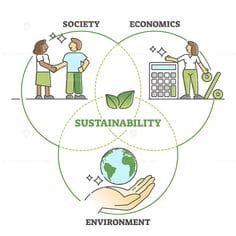Business and society are closely connected, and understanding this relationship is crucial for both companies and communities. At its core, business refers to any organization or entity that provides goods or services to meet the needs of people. Society is the community of individuals who live together in a shared environment, where norms, values, and laws guide behavior.

Businesses operate in society, and society, in turn, shapes how businesses function. This connection is important because businesses don’t just exist in a vacuum. They affect people’s lives in many ways, from creating jobs to influencing the economy, health, and even the environment.
Table of Contents
For example, businesses create products that we use daily, like smartphones, food, and clothing. But businesses also need things from society like workers, natural resources, and the laws that govern how they operate. If businesses want to succeed, they need to consider the needs and expectations of society. This is why the relationship between business and society is often described as mutually beneficial.
The Relationship Between Business and Society – A Systems Perspective

The systems perspective looks at business and society as parts of a larger system that constantly interact with one another. Think of it like a circle: businesses are affected by what happens in society, and businesses also influence society through what they produce and how they operate. The relationship between business and society is interconnected. Businesses provide products and services that meet the needs of people, while society offers the resources and environment businesses need to operate. In return, businesses influence society through their operations, products, and decisions. Business and Society relationship is mutually beneficial, with businesses impacting social, economic, and environmental factors, and society shaping the way businesses function.
In this view
Business as a Part of Society: Businesses are not isolated from the world. They rely on society for things like raw materials, employees, customers, and even legal frameworks that ensure they function fairly.
Mutual Influence: On the flip side, businesses affect society through their products, services, and overall operations. For instance, a tech company might bring new innovations that change how people communicate. Or a manufacturing company might impact the environment based on how it handles waste and emissions.
Constant Change: The relationship between business and society isn’t fixed—it changes over time based on new social trends, technological advancements, and global events like pandemics or environmental challenges.
Feedback Loops: Just as society affects business, businesses also influence societal norms. For example, companies may promote social responsibility, making people more aware of ethical issues like fair trade or climate change.
By viewing the relationship through this systems lens, we can better understand how businesses and society are interdependent and how they need to balance their interests for long-term success.
Forces Shaping the Business and Society Relationship
Several forces influence how business and society interact. These include:
Economic Forces
Businesses need a stable economy to thrive, but the economy is shaped by society’s needs and behaviors. For example, a recession can lead to fewer people buying goods, forcing businesses to adapt their strategies. On the other hand, a booming economy can increase demand for products, benefiting businesses.
Technological Forces
Technological advancements also play a big role. Innovations like the internet, social media, and artificial intelligence change how businesses operate. For instance, e-commerce platforms like Amazon have transformed how people shop, and businesses that adapt to these technologies can gain an advantage in the market.
Political and Legal Forces
Governments create laws and regulations that businesses must follow. These include tax laws, labor laws, and environmental regulations. Businesses must stay compliant to avoid penalties, but they also play a role in influencing policies through lobbying or corporate social responsibility (CSR) efforts.
Social Forces
Social trends, values, and expectations also shape business operations. For example, growing awareness of environmental issues has led to more sustainable practices in businesses. As society demands better treatment of workers and fair business practices, companies have to adapt to these expectations.
Cultural Forces
Different cultures and regions have unique expectations of businesses. A company that operates globally may need to adapt to cultural differences to succeed in various markets. For example, a product that works well in one country may need to be modified to suit the tastes, preferences, or legal requirements of another.
Changing Societal Expectations Growing Emphasis on Ethical Values
As society evolves, so do its expectations of businesses. Over the past few decades, people have become more aware of issues like environmental sustainability, human rights, and fair labor practices. These concerns are pushing businesses to be more transparent, responsible, and ethical.
Ethical values in business have become a major topic. It’s no longer enough for businesses to just focus on profit; they are increasingly being judged by how they contribute to society and treat people. Customers, investors, and even employees expect businesses to:
Care for the environment: Many consumers now prefer companies that use eco-friendly materials, reduce waste, or adopt green technologies.
Treat employees fairly: This includes offering good wages, fair working conditions, and respect for workers’ rights.
Engage in social responsibility: Companies are expected to give back to society, whether by supporting charities, promoting diversity, or investing in community development.
The growing importance of these ethical values has led businesses to rethink their strategies and integrate social and environmental concerns into their decision-making. This is often referred to as Corporate Social Responsibility (CSR), where businesses actively work to improve society while maintaining profitability.
The Changing Workplace External Factors Influencing the Workplace
The workplace is also changing due to a variety of external factors. Businesses are being influenced by:
Government Intervention
Governments play a significant role in shaping the workplace. Through laws and regulations, they establish rules regarding worker rights, health and safety, wages, and working hours. Over time, governments have introduced policies to protect workers from exploitation and ensure that businesses operate fairly. Examples include labor laws that protect employees from unfair treatment and health regulations that make workplaces safer.
Women at Work
Over the past few decades, there has been a major shift in the workplace with more women joining the workforce. Women now make up a significant portion of the labor force in many industries. However, there are still challenges like the gender pay gap, underrepresentation in leadership roles, and balancing work with family responsibilities.
- Many businesses have responded to this by offering flexible work arrangements, such as remote work or flexible hours, and promoting gender equality in hiring and promotions.
- Gender diversity has become a priority for many companies, as research shows that diverse teams often perform better and bring more innovative ideas to the table.
Technology and Automation
Advances in technology are changing the types of jobs available and how work is done. Automation and AI are replacing some jobs but also creating new ones, especially in fields like technology, healthcare, and renewable energy. Businesses must adapt to these changes by reskilling their employees and creating opportunities for people to thrive in the digital age.
Globalization
Businesses now operate on a global scale, meaning that their workforce and operations are spread across many countries. This brings both opportunities and challenges. While it allows companies to tap into global talent and markets, it also means they need to navigate different cultural norms, legal systems, and economic conditions.
Corporate Efforts to Promote Diversity
Promoting diversity and inclusion in the workplace has become an important goal for many companies. Businesses have recognized that diverse teams comprising people from different races, genders, ages, and backgrounds bring a wider range of perspectives and ideas, which can lead to better decision-making and innovation.
Corporate diversity efforts often focus on:
Recruiting diverse talent
Companies are now actively seeking to hire people from underrepresented groups, whether based on race, gender, or other factors.
Inclusive culture
It’s not enough to hire diverse people; businesses must also create a culture where everyone feels valued and respected. This includes providing equal opportunities for advancement and addressing any forms of discrimination or bias in the workplace.
Training and Education
Many businesses offer diversity training to help employees understand and appreciate differences and to reduce unconscious biases.
Leadership representation
Companies are focusing on having diverse leaders in positions of power, ensuring that decision-making reflects a variety of perspectives.
Efforts to promote diversity are not just about being socially responsible—they also have business benefits. Studies show that diverse companies tend to perform better financially, attract top talent, and have a better reputation among consumers and investors.
Conclusion
In today’s world, the relationship between business and society is increasingly important and interconnected. Businesses are not isolated from the society in which they operate they are shaped by the needs, expectations, and values of the people they serve. At the same time, businesses influence society through their products, services, and practices.
As we look to the future, businesses will need to adapt to changing societal expectations, address global challenges like climate change, and continue to prioritize ethical values, diversity, and inclusion. Companies that understand the importance of their role in society and act responsibly will not only create value for themselves but also contribute to a better and more sustainable world.
Frequently Asked Questions (FAQ)
What is the relationship between business and society?
The relationship between business and society is interconnected. Businesses provide products and services that meet the needs of people, while society offers the resources and environment businesses need to operate. In return, businesses influence society through their operations, products, and decisions. Business and Society relationship is mutually beneficial, with businesses impacting social, economic, and environmental factors, and society shaping the way businesses function.
Why is globalization important for businesses and society?
Globalization is important because it connects business and society worldwide:
Business Growth: Globalization opens new markets, allowing businesses to expand their customer base and increase revenues.
Cultural Exchange: It promotes the exchange of ideas, goods, and services between cultures, which can lead to new innovations
Job Creation: Globalization creates job opportunities by enabling businesses to operate in multiple countries.
Challenges: While globalization brings benefits, it can also create challenges such as income inequality, job displacement, and environmental issues due to global supply chains.
Related Articles

